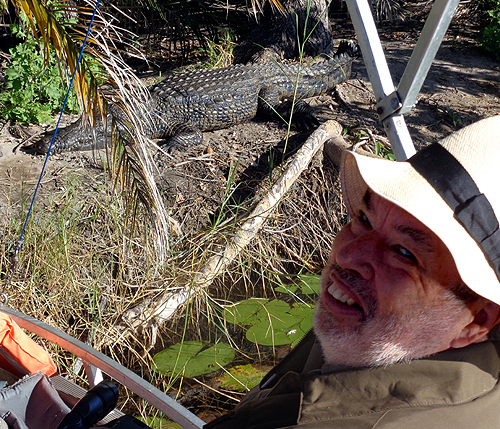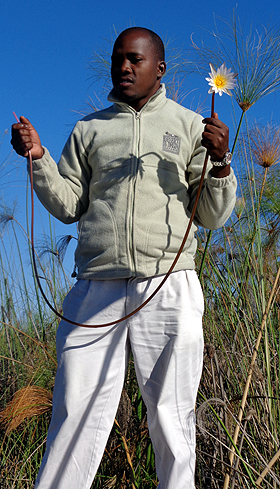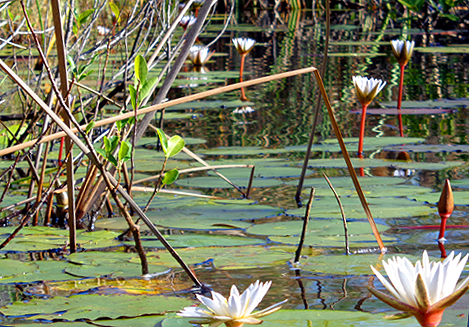 Guides make or break a wilderness trip, and this is so much truer in places like the Okavango Delta, which is difficult to truly appreciate without adequate interpretation. Fortunately for us our guide here was outstanding.
Guides make or break a wilderness trip, and this is so much truer in places like the Okavango Delta, which is difficult to truly appreciate without adequate interpretation. Fortunately for us our guide here was outstanding.
Think of the Okavango Delta as similar to the Everglades or Amazon. Of course it’s as different as it is the same as these other wildernesses, but in all three cases the particular feature is a unique biodiversity that isn’t immediately apparent, visually overwhelming because of the density of plants, and at least some of the year with a very uncomfortable climate.
Jungle, in other words.
The Delta is a “jungle” swamp, the outcome of the enormous flow of water coming off Africa’s ridiculously off-center continental divide spilling over the Kalahari Desert. And because the Delta’s flow from year to year can be so radically different, the topographical features are constantly changing. With a few major exceptions like the enormous land mass in the middle of the Delta called “Chief’s Island” the water channels, smaller islands, thousands of lagoons and marshes are in nearly constant flux.
To make things even more complicated, there is no Okavango Delta defined by any wilderness area or natural geography. Moremi Game Reserve includes part of The Delta, but since the Delta changes from year to year, you can’t buy a map of the static Okavango Delta. And as a result, numerous camps and lodges call themselves Delta camps with some abandon, and many visitors to Botswana believe they have visited The Delta when they probably haven’t.

Birders have no problem appreciating the Delta. We have been particularly lucky, catching several migrants that would normally have left by now, such as the Greater Marsh Warbler. But the resident species from the African Fish Eagle to the spectacular Malachite Kingfisher are abundant and relatively easy to find. Truly rare birds like Pell’s Fishing Eagle are becoming so popular that their whereabouts are often known throughout the year.
There are animals in The Delta, to be sure.
We saw quite a few elephant, which of course seems to be true everywhere, today. But the elephant are essential in cutting out the channels from year to year. As the flow declines in September and October, the elephants choose paths through The Delta that are likely to become next year’s channels.
We also saw the water animals, the red lechwe and puku, two land antelopes that survive at water’s edge. We hope yet to find the rarer sitantunga, an antelope that remains in the water most of its life, has webbed feet and births in a nest of reeds.
We got remarkably close to a 3-meter long croc that had recently feasted and was deep into dormancy. And hippos are virtually everywhere, sometimes as in our case, right outside our bungalows!
But despite this panoply of bigger game, it is never as abundant or visible as in any more common wilderness reserve like The Pans from which we just came, or to Moremi Game Reserve to which we’re heading tomorrow.
So the essential appreciation comes from learning about the intricacies of this mighty biosphere. Our guide explained at length the flows of The Delta and how that sculpts the landscape from year to year. He taught us about the water lillies, and how the two main species complement each other opening and closing at day and night. We tracked the path of ancient elephants by the unusual stands of palm trees, and most popualr of all, held the half-thumbnail size painted and long-toed frogs, whose voices exceed most normal lake frogs at home.
We caught brim and cat fish and fried them up for dinner! We watched Pied Kingfishers and Fish Eagles dive for their prey. And we enjoyed our sundowners overlooking our own private lagoon, literally miles from the next tourist outpost, providing that essential remoteness that allows the casual visitor to understand the intractable power of the wild.

Doen’t your esteemed guide deserve a name?